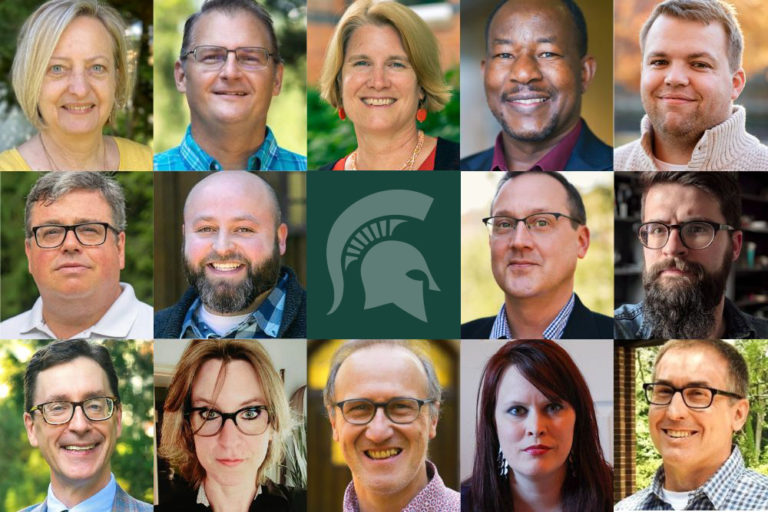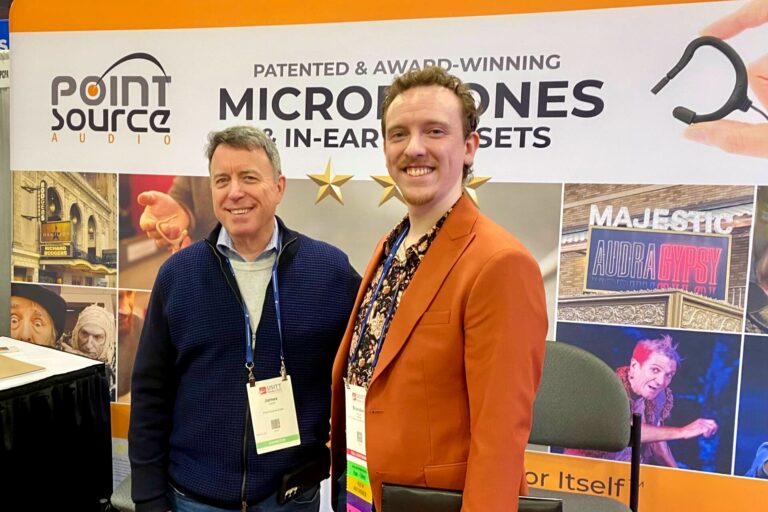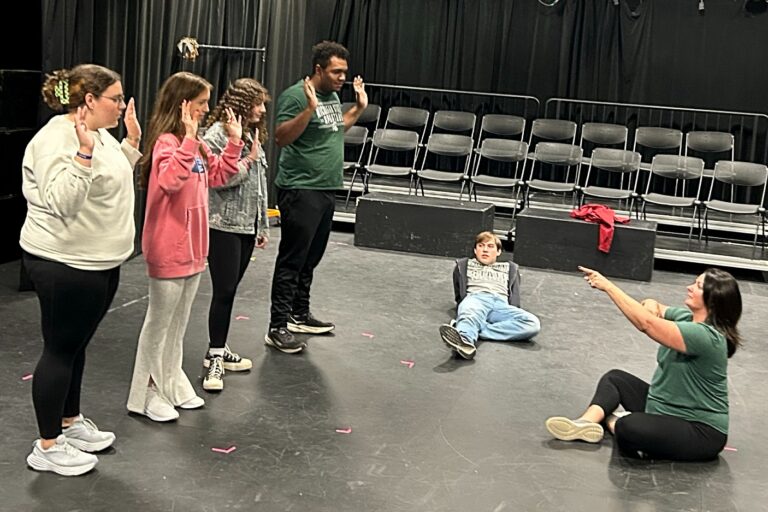Ural Grant, MFA Acting Candidate in the Department of Theatre, was named the November 2023 Educator of the Month by the Graduate School at Michigan State University.
Each month, MSU’s Graduate School features a graduate or postdoc educator as its Educator of the Month to share their unique stories and perspectives on what it means to be a dedicated educator, how they’ve overcome educational challenges, and the ways they have grown through their experiences.

In the following Q&A, which originally was published on the Graduate School website, Grant shares how the quote “Learning happens when knowledge ends” by playwright Michael J. Bobbitt helps to inform his collaborative approach to teaching and learning.
What does it mean to be an educator at a university?
My pedagogical viewpoint on the role of an educator is deeply influenced by the insight encapsulated in the quote by acclaimed playwright Michael J. Bobbitt: “Learning happens when knowledge ends.” This statement underpins my belief in education, where the traditional roles of teacher and student converge to create a rich, collaborative, and transformative learning experience.
Bobbitt’s words resonate with me as a reminder that the pursuit of knowledge is not a linear journey with a fixed destination, but an ongoing process marked by exploration, inquiry, and a willingness to embrace the unknown. The idea that “learning happens when knowledge ends” underscores the importance of reciprocity in the educational relationship. As an educator, I see myself as a provider of information and a facilitator of collaborative learning experiences. Through dialogue, active listening, and shared exploration, I like to create spaces where students become co-creators of knowledge alongside me. This reciprocity fosters a sense of ownership and agency in their learning journeys.
I also believe, in part, that the role of an educator is to cultivate a sense of belonging within the classroom. Learning happens best within trusting relationships, so I think it’s important to promote an inclusive environment where all voices and identities are valued. Through collaborative projects, personal check-ins, and celebrating diversity, I try to help each student feel secure in who they are and that they matter. My goal is for the classroom to be a place where students can bring their whole, authentic selves into the learning process.
What challenges have you experienced and how have you grown from them?
The work is hard. The work of cultivating a sense of belonging; the work of meeting students where they are can sometimes be challenging. And yes, while there is great value in doing this work, inherently we can’t please everyone.
Once again, my viewpoint of an educator is to support and facilitate learning journeys; however, the journey is owned by the learner. It can be challenging to know and experience in real time that there are so many factors outside of our control as educators.
Trauma-informed pedagogy teaches us that some students’ lived experiences can have an adverse effect on their learning. In situations like these, I’ve learned to lean into discomfort. I’ve learned to be open to having honest and sometimes difficult conversations, open to flexibility, and trust and validate for myself that I as an educator showed up the best that I could with the tools and knowledge that I had present at that moment in time.
What value do you see in Teaching Professional Development?
I think there is great value in Teaching Professional Development (TPD). Graduate students need opportunities to develop their teaching abilities, including effective communication, designing engaging curricula, and facilitating active learning. Professional development such as workshops, mentorships with faculty, and teaching assistantships provide essential hands-on experience.
As emphasized earlier, the pursuit of knowledge is a lifelong endeavor. TPD can be an introduction to new instructional technologies or advancements in pedagogical theories. During my time here at MSU, I have been fortunate to take part in professional development opportunities that have deeply informed my understanding of diversity, equity, and inclusion (DEI); cultures of care; and teaching with empathy. Workshops on implicit bias and ethics of care have opened my eyes to the systemic inequities within education and society as a whole. They have shown me tangible ways I can make my classroom more welcoming and supportive for students of all backgrounds.
Additionally, fellowships focused on inclusive pedagogies and restorative justice have reinforced for me the immense power educators have in shaping students’ sense of belonging. I’ve learned the importance of seeing students in their humanity and meeting their needs with compassion. At MSU and throughout life, I have had strong mentors who have also modeled how to teach with insight into students’ perspectives, making space for their voices to be heard. I am a firm believer that learning happens only when students feel secure in being their authentic selves and that these lessons of empathy and cultural awareness through TPD have helped to equip me.
What is one piece of advice you would give other graduate educators?
A piece of advice that I would give graduate students is to discover (if you haven’t already found) your purpose and to stand firm in that conviction. It’s important for graduate students to know their core values and larger vision in order to guide their choices. Periodically reflecting on their reasons for pursuing graduate school can oftentimes clarify priorities. A sense of purpose endures, it can anchor you during challenging times.
I’ve found as a graduate student that measuring my successes by personal growth and upholding my convictions has served me well. For me, walking in purpose and trusting that that is enough has proved to matter more than external metrics, perfection, or other people’s approval. Along these lines, I would also add to be bold in your advocacy for yourself and your needs as a graduate student.
As highlighted earlier, the journey of the learner is owned by the learner. Make your voice heard and find strong allies who will support you along the way. Last but certainly not least, prioritize joy! Adding a sense of playfulness and delight can counterweigh the stressful demands of coursework, research, and teaching. Prioritizing joy can manifest itself in a variety of ways like making time for hobbies, seeing loved ones, celebrating small accomplishments, and eating ice cream!
What do you enjoy in your free time?
I like to go on walks. I like to be in community with loved ones. I like to cook. The capitalist/perfectionist in me likes to plan “what’s next” (although many people might say that I’m not a perfectionist, there is a small bit of it in me)!


